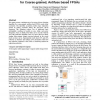Free Online Productivity Tools
i2Speak
i2Symbol
i2OCR
iTex2Img
iWeb2Print
iWeb2Shot
i2Type
iPdf2Split
iPdf2Merge
i2Bopomofo
i2Arabic
i2Style
i2Image
i2PDF
iLatex2Rtf
Sci2ools
GLVLSI
2006
IEEE
2006
IEEE
Low-power clustering with minimum logic replication for coarse-grained, antifuse based FPGAs
This paper presents a minimum area, low-power driven clustering algorithm for coarse-grained, antifuse-based FPGAs under delay constraints. The algorithm accurately predicts logic replication caused by timing constraint during the low-power driven clustering. This technique reduces size of duplicated logic substantially, resulting in benefits in area, delay, and power dissipation. First, we build power-delay curves at nodes with the aid of the prediction algorithm. Next, we choose the best cluster starting from primary outputs moving backward in the circuit based on these curves. Experimental results show 16% and 20% reduction in dynamic and leakage power dissipation with 18% area reduction compared to the results of clustering without the replication prediction. Categories and Subject Descriptors J.6 [Computer-aided engineering]: Computer-aided design (CAD) General Terms Algorithm Keywords FPGA, Antifuse, Clustering, Power
| Added | 11 Jun 2010 |
| Updated | 11 Jun 2010 |
| Type | Conference |
| Year | 2006 |
| Where | GLVLSI |
| Authors | Chang Woo Kang, Massoud Pedram |
Comments (0)

